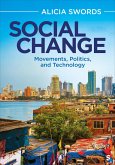- Broschiertes Buch
- Merkliste
- Auf die Merkliste
- Bewerten Bewerten
- Teilen
- Produkt teilen
- Produkterinnerung
- Produkterinnerung
Development and Social Change explores the historical, socio-political, and ecological aspects of development. The Eighth Edition critically engages with the concept of development, tracing its roots and examining its implications in the contemporary world.
Andere Kunden interessierten sich auch für
![Social Change Social Change]() Alicia SwordsSocial Change167,99 €
Alicia SwordsSocial Change167,99 €![Social Stratification and Economic Change Social Stratification and Economic Change]() Social Stratification and Economic Change39,99 €
Social Stratification and Economic Change39,99 €![A Grassroots Leadership & Arts for Social Change Primer: For Educators, Organizers, Activists & Rabble-Rousers A Grassroots Leadership & Arts for Social Change Primer: For Educators, Organizers, Activists & Rabble-Rousers]() Susan J. ErenrichA Grassroots Leadership & Arts for Social Change Primer: For Educators, Organizers, Activists & Rabble-Rousers34,99 €
Susan J. ErenrichA Grassroots Leadership & Arts for Social Change Primer: For Educators, Organizers, Activists & Rabble-Rousers34,99 €![Mainstream and Critical Social Theory Mainstream and Critical Social Theory]() Jeffrey A. Alexander / Jeffrey C Alexander (eds.)Mainstream and Critical Social Theory1.291,99 €
Jeffrey A. Alexander / Jeffrey C Alexander (eds.)Mainstream and Critical Social Theory1.291,99 €![The Roles of Government and Industry in Research and Development for the Maritime Industries The Roles of Government and Industry in Research and Development for the Maritime Industries]() Marine BoardThe Roles of Government and Industry in Research and Development for the Maritime Industries36,99 €
Marine BoardThe Roles of Government and Industry in Research and Development for the Maritime Industries36,99 €![From Anthropology to Social Theory From Anthropology to Social Theory]() Arpad SzakolczaiFrom Anthropology to Social Theory41,99 €
Arpad SzakolczaiFrom Anthropology to Social Theory41,99 €![Tom Hayden on Social Movements: Four unpublished talks and the Rolling Stone interview Tom Hayden on Social Movements: Four unpublished talks and the Rolling Stone interview]() Tom HaydenTom Hayden on Social Movements: Four unpublished talks and the Rolling Stone interview17,99 €
Tom HaydenTom Hayden on Social Movements: Four unpublished talks and the Rolling Stone interview17,99 €-
-
-
Development and Social Change explores the historical, socio-political, and ecological aspects of development. The Eighth Edition critically engages with the concept of development, tracing its roots and examining its implications in the contemporary world.
Hinweis: Dieser Artikel kann nur an eine deutsche Lieferadresse ausgeliefert werden.
Hinweis: Dieser Artikel kann nur an eine deutsche Lieferadresse ausgeliefert werden.
Produktdetails
- Produktdetails
- Verlag: Sage Publications Inc Ebooks
- Seitenzahl: 328
- Erscheinungstermin: 14. April 2025
- Englisch
- Abmessung: 228mm x 152mm
- Gewicht: 450g
- ISBN-13: 9781071903506
- ISBN-10: 1071903500
- Artikelnr.: 72700744
- Herstellerkennzeichnung
- Libri GmbH
- Europaallee 1
- 36244 Bad Hersfeld
- gpsr@libri.de
- Verlag: Sage Publications Inc Ebooks
- Seitenzahl: 328
- Erscheinungstermin: 14. April 2025
- Englisch
- Abmessung: 228mm x 152mm
- Gewicht: 450g
- ISBN-13: 9781071903506
- ISBN-10: 1071903500
- Artikelnr.: 72700744
- Herstellerkennzeichnung
- Libri GmbH
- Europaallee 1
- 36244 Bad Hersfeld
- gpsr@libri.de
Philip McMichael grew up in Adelaide, South Australia, completing undergraduate degrees in economics and in political science at the University of Adelaide. After traveling in India, Pakistan, and Afghanistan and doing community work in Papua New Guinea, he pursued his doctorate in sociology at the State University of New York at Binghamton. He has taught at the University of New England (New South Wales), Swarthmore College, and the University of Georgia, and he is presently Emeritus Professor of Global Development at Cornell University, in Ithaca, NY. Other appointments include Visiting Senior Research Scholar in International Development at the University of Oxford (Wolfson College) and Visiting Scholar, School of Political Science and International Relations at the University of Queensland. His book Settlers and the Agrarian Question: Foundations of Capitalism in Colonial Australia (1984) won the Social Science History Association's Allan Sharlin Memorial Award in 1985. In addition to authoring Food Regimes and Agrarian Questions (2013), McMichael edited The Global Restructuring of Agro-Food Systems (1994), Food and Agrarian Orders in the World Economy (1995), New Directions in the Sociology of Global Development (2005) with Frederick H. Buttel, Contesting Development: Critical Struggles for Social Change (2010), The Politics of Biofuels, Land and Agrarian Change (2011) with Jun Borras and Ian Scoones, and Finance or Food? The Role of Cultures, Values and Ethics in Land Use Negotiations, with Hilde Bjørkhaug and Bruce Muirhead (2020). He has served twice as chair of his department, as director of Cornell University's International Political Economy Program, as chair of the American Sociological Association's Political Economy of the World-System Section, as president of the Research Committee on Agriculture and Food for the International Sociological Association. He is also an active member of the International Studies Association. He has also worked with the Food and Agriculture Organization of the United Nations (FAO) and the Civil Society Mechanism of the FAO's Committee on World Food Security (CFS), the UN Research Institute for Social Development (UNRISD), the international peasant coalition Via Campesina, and the International Planning Committee for Food Sovereignty.
Preface to the Eighth Edition
Acknowledgments
About the Authors
Abbreviations
Chapter 1 Development
Introduction
Development as an historically relational process
What Is the World Coming To?
Development: History and Politics
Development Theory
Social Change
Conclusion
Part I The Development Project (Late 1940s to Early 1970s)
Chapter 2 Contextualizing the Development Project: Colonialism,
Anticolonial Struggles, and Decolonization
Colonialism
Decolonization
Decolonization and Development
Postwar Decolonization and the Rise of the Third World
Ingredients of the Development Project
Framing the Development Project
Economic Nationalism
Conclusion
Chapter 3 The Development Project: An International Framework in Global
Context
The Development Project: What Were Its Main Objectives and How Were They
Realized?
The Development Project: An International Framework for National
Development
Remaking the International Division of Labor
The Food Aid Regime
Remaking Third World Agricultures
Conclusion
Part II The Globalization Project (1980s to 2000s)
Chapter 4 Instituting the Globalization Project
Neo-classical Economics and Neoliberalism: Global Market Society
The Debt Crisis and Structural Adjustment Programs: Organizing Neoliberal
Development
Geopolitics and the Globalization Project
Conclusion
Chapter 5 Experiencing the Globalization Project: Processes and
Implications
The (New) Global Division of Labor and Outsourcing
Global Labor-Sourcing Politics and Migration
Neoliberal Development and Extractivism: Reconfiguring International
Relations
Agricultural Globalization
Conclusion
Chapter 6 The Globalization Project in Crisis
Social Crisis
Legitimacy Crisis
Geopolitical Transitions
Deglobalization?
Conclusion
Chapter 7 Global Re-orderings
Globalization project legacies
Nascent development trajectories
Conclusion
Chapter 8 Development Climate, or The Nature of Development
Life-Worlds at Odds
The Politics of Climate Change
Business as Usual?
Sustainable Intensification Proposals
Sustainable Intensification in Question
Renewable Energy
Conclusion: Ecosystem Priority
Chapter 9 Public and Local Green Initiatives
Public Greening Initiatives
Urban Initiatives
Circular Economy
Transition Towns
The Commons
Rural Initiatives
Agroecology
Conclusion
Chapter 10 Toward Sustainable Development
Ingredients of Project Coherence
What Is Appropriate to These Times?
Sustainable Development Project Implementation
Conclusion
Notes
References
Index
Acknowledgments
About the Authors
Abbreviations
Chapter 1 Development
Introduction
Development as an historically relational process
What Is the World Coming To?
Development: History and Politics
Development Theory
Social Change
Conclusion
Part I The Development Project (Late 1940s to Early 1970s)
Chapter 2 Contextualizing the Development Project: Colonialism,
Anticolonial Struggles, and Decolonization
Colonialism
Decolonization
Decolonization and Development
Postwar Decolonization and the Rise of the Third World
Ingredients of the Development Project
Framing the Development Project
Economic Nationalism
Conclusion
Chapter 3 The Development Project: An International Framework in Global
Context
The Development Project: What Were Its Main Objectives and How Were They
Realized?
The Development Project: An International Framework for National
Development
Remaking the International Division of Labor
The Food Aid Regime
Remaking Third World Agricultures
Conclusion
Part II The Globalization Project (1980s to 2000s)
Chapter 4 Instituting the Globalization Project
Neo-classical Economics and Neoliberalism: Global Market Society
The Debt Crisis and Structural Adjustment Programs: Organizing Neoliberal
Development
Geopolitics and the Globalization Project
Conclusion
Chapter 5 Experiencing the Globalization Project: Processes and
Implications
The (New) Global Division of Labor and Outsourcing
Global Labor-Sourcing Politics and Migration
Neoliberal Development and Extractivism: Reconfiguring International
Relations
Agricultural Globalization
Conclusion
Chapter 6 The Globalization Project in Crisis
Social Crisis
Legitimacy Crisis
Geopolitical Transitions
Deglobalization?
Conclusion
Chapter 7 Global Re-orderings
Globalization project legacies
Nascent development trajectories
Conclusion
Chapter 8 Development Climate, or The Nature of Development
Life-Worlds at Odds
The Politics of Climate Change
Business as Usual?
Sustainable Intensification Proposals
Sustainable Intensification in Question
Renewable Energy
Conclusion: Ecosystem Priority
Chapter 9 Public and Local Green Initiatives
Public Greening Initiatives
Urban Initiatives
Circular Economy
Transition Towns
The Commons
Rural Initiatives
Agroecology
Conclusion
Chapter 10 Toward Sustainable Development
Ingredients of Project Coherence
What Is Appropriate to These Times?
Sustainable Development Project Implementation
Conclusion
Notes
References
Index
Preface to the Eighth Edition
Acknowledgments
About the Authors
Abbreviations
Chapter 1 Development
Introduction
Development as an historically relational process
What Is the World Coming To?
Development: History and Politics
Development Theory
Social Change
Conclusion
Part I The Development Project (Late 1940s to Early 1970s)
Chapter 2 Contextualizing the Development Project: Colonialism,
Anticolonial Struggles, and Decolonization
Colonialism
Decolonization
Decolonization and Development
Postwar Decolonization and the Rise of the Third World
Ingredients of the Development Project
Framing the Development Project
Economic Nationalism
Conclusion
Chapter 3 The Development Project: An International Framework in Global
Context
The Development Project: What Were Its Main Objectives and How Were They
Realized?
The Development Project: An International Framework for National
Development
Remaking the International Division of Labor
The Food Aid Regime
Remaking Third World Agricultures
Conclusion
Part II The Globalization Project (1980s to 2000s)
Chapter 4 Instituting the Globalization Project
Neo-classical Economics and Neoliberalism: Global Market Society
The Debt Crisis and Structural Adjustment Programs: Organizing Neoliberal
Development
Geopolitics and the Globalization Project
Conclusion
Chapter 5 Experiencing the Globalization Project: Processes and
Implications
The (New) Global Division of Labor and Outsourcing
Global Labor-Sourcing Politics and Migration
Neoliberal Development and Extractivism: Reconfiguring International
Relations
Agricultural Globalization
Conclusion
Chapter 6 The Globalization Project in Crisis
Social Crisis
Legitimacy Crisis
Geopolitical Transitions
Deglobalization?
Conclusion
Chapter 7 Global Re-orderings
Globalization project legacies
Nascent development trajectories
Conclusion
Chapter 8 Development Climate, or The Nature of Development
Life-Worlds at Odds
The Politics of Climate Change
Business as Usual?
Sustainable Intensification Proposals
Sustainable Intensification in Question
Renewable Energy
Conclusion: Ecosystem Priority
Chapter 9 Public and Local Green Initiatives
Public Greening Initiatives
Urban Initiatives
Circular Economy
Transition Towns
The Commons
Rural Initiatives
Agroecology
Conclusion
Chapter 10 Toward Sustainable Development
Ingredients of Project Coherence
What Is Appropriate to These Times?
Sustainable Development Project Implementation
Conclusion
Notes
References
Index
Acknowledgments
About the Authors
Abbreviations
Chapter 1 Development
Introduction
Development as an historically relational process
What Is the World Coming To?
Development: History and Politics
Development Theory
Social Change
Conclusion
Part I The Development Project (Late 1940s to Early 1970s)
Chapter 2 Contextualizing the Development Project: Colonialism,
Anticolonial Struggles, and Decolonization
Colonialism
Decolonization
Decolonization and Development
Postwar Decolonization and the Rise of the Third World
Ingredients of the Development Project
Framing the Development Project
Economic Nationalism
Conclusion
Chapter 3 The Development Project: An International Framework in Global
Context
The Development Project: What Were Its Main Objectives and How Were They
Realized?
The Development Project: An International Framework for National
Development
Remaking the International Division of Labor
The Food Aid Regime
Remaking Third World Agricultures
Conclusion
Part II The Globalization Project (1980s to 2000s)
Chapter 4 Instituting the Globalization Project
Neo-classical Economics and Neoliberalism: Global Market Society
The Debt Crisis and Structural Adjustment Programs: Organizing Neoliberal
Development
Geopolitics and the Globalization Project
Conclusion
Chapter 5 Experiencing the Globalization Project: Processes and
Implications
The (New) Global Division of Labor and Outsourcing
Global Labor-Sourcing Politics and Migration
Neoliberal Development and Extractivism: Reconfiguring International
Relations
Agricultural Globalization
Conclusion
Chapter 6 The Globalization Project in Crisis
Social Crisis
Legitimacy Crisis
Geopolitical Transitions
Deglobalization?
Conclusion
Chapter 7 Global Re-orderings
Globalization project legacies
Nascent development trajectories
Conclusion
Chapter 8 Development Climate, or The Nature of Development
Life-Worlds at Odds
The Politics of Climate Change
Business as Usual?
Sustainable Intensification Proposals
Sustainable Intensification in Question
Renewable Energy
Conclusion: Ecosystem Priority
Chapter 9 Public and Local Green Initiatives
Public Greening Initiatives
Urban Initiatives
Circular Economy
Transition Towns
The Commons
Rural Initiatives
Agroecology
Conclusion
Chapter 10 Toward Sustainable Development
Ingredients of Project Coherence
What Is Appropriate to These Times?
Sustainable Development Project Implementation
Conclusion
Notes
References
Index








